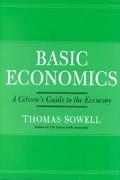
Basic Economics - A Citizen's Guide to the Economy PDF
Preview Basic Economics - A Citizen's Guide to the Economy
At last there is a citizen's guide to the economy, written by an economist who uses plain English. No jargon, no graphs, no equations. Yet this is a comprehensive survey, covering everything from rent control and the rise and fall of businesses to the international balance of payments.The purpose of Basic Economics is to enable people without any economic training to understand the way the economy functions-not only the American economy, but other economies around the world.Some of the clearest demonstrations of the role of prices, for example, come from economies in which prices are not allowed to function-with consequences which show just what those functions are and what happens when they are lacking.In the end, this is not a book from which to cram facts, but one from which to gain an understanding of the economy that will enable you to form your own conclusions on the basis of tested principles, rather than on the basis of emotion or rhetoric. That is the goal of the journey, but you should also enjoy the trip along the way.
From Publishers WeeklyA well-known conservative columnist, author and economist, Sowell (A Personal Odyssey, etc.) presents an introductory course in economics with an emphasis on public policy. Forgoing jargon, equations, graphs and complicated exposition, he's produced a book that's easy to read and understand, though it tends to be superficial and is written in an angry tone, often accusing others of economic ignorance, as if that is the only possible explanation for disagreement with the author's views. Sowell is at his best discussing microeconomics in the first two-thirds of the book. Unlike most accounts, which cover the subject from the point of view of business or investment, Sowell concentrates on government action, in an effort to prepare the reader for civic participation. He addresses price controls and subsidies in detail, both as important political issues in their own right and to demonstrate how prices work by showing what happens when they are constrained. In the final third of the book, he wades into more complex and controversial territory--macroeconomics, international economics and popular fallacies--and his effort to cover them at the elementary level results in a muddled treatment. Overall, his defense of certain conservative tenets is wielded with a sledgehammer rather than a rapier. Agent, Carol Mann. (Feb. 15)Forecast: Sowell's many fans will appreciate this book (which is supported by a radio satellite tour), though it is probably most appropriate as a gift to junior high school relatives, accompanied by a bribe to read it. General readers can--and some of them will--find better written, more sophisticated introductions to economics, including such middle-of-the-road overviews as From Here to Economy: A Short Cut to Economic Literacy by Todd G. Buchholz or New Ideas from Dead Economists: An Introduction to Modern Economic Thought by Todd G. Buchholz and Martin Feldstein. For a conservative viewpoint, Capitalism and Freedom by Milton Friedman has yet to be topped.
Copyright 2001 Cahners Business Information, Inc.
From Library JournalSyndicated columnist Sowell (economics, Hoover Inst.) is the author of 31 books and monographs on a broad range of topics, including race, culture, education, social policy, philosophy, and economics. In this groundbreaking work, he explains the basics of economics without resorting to the graphs, equations, and jargon that typically fill the textbooks and literature in the field. Along the way, he explains exactly what economics is and what its guiding principles are. Sowell covers a broad range of topics, from scarcity, the balance of trade, and price controls to minimum-wage laws, competition, profits and losses, and the role of government. Intended as a primer for the citizen not trained in the basics of economic theory, this book is flawed only in a somewhat confusing organization that leads to repetition. Recommended for public libraries. Norm Hutcherson, California State Univ., Bakersfield
Copyright 2001 Reed Business Information, Inc.
